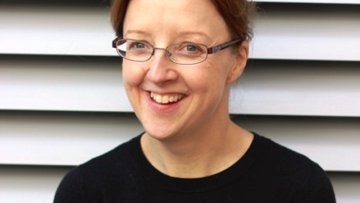Oxford Mathematician Sarah Waters has been awarded a Royal Society Leverhulme Trust Senior Research Fellowship commencing this month. Sarah is an applied mathematician here in Oxford. Her interest is in physiological fluid mechanics, tissue biomechanics and the application of mathematics to problems in medicine and biology.
Modern science and technology generate data at an unprecedented rate. A major challenge is that this data is often complex, high dimensional and may include temporal and/or spatial information. The 'shape' of the data can be important but it is difficult to extract and quantify it using standard machine learning or statistical techniques. For example, an image of blood vessels near a tumour looks very different to an image of healthy blood vessels; statistics alone cannot quantify this difference. New shape analysis methods are required.
Improving Integrands & Integrals for Amplitudes
Abstract
There have been enormous advances in both our ability to represent scattering amplitudes at the integrand-level (for an increasingly wide variety of quantum field theories), and also in our integration technology (and our understanding of the functions that result). In this talk, I review both sides of these recent developments. At the integrand-level, I describe the "prescriptive" refinement of generalized unitarity, and show how closed, integrand-level formulae can be given for all leading-weight contributions to any amplitude in any quantum field theory. Regarding integration, I describe some new results that could be summarized as "dual-conformal sufficiency": that all planar, ultraviolet-finite integrands can be regulated and computed directly in terms of manifestly dual-conformal integrals. I illustrate the power of having such representations, and discuss the role played by a (conjectural) cluster-algebraic structure for kinematic dependence.
Systemic-risk-efficient asset allocation: Minimization of systemic risk as a network optimization problem
Abstract
Systemic risk arises as a multi-layer network phenomenon. Layers represent direct financial exposures of various types, including interbank liabilities, derivative or foreign exchange exposures. Another network layer of systemic risk emerges through common asset holdings of financial institutions. Strongly overlapping portfolios lead to similar exposures that are caused by price movements of the underlying financial assets. Based on the knowledge of portfolio holdings of financial agents we quantify systemic risk of overlapping portfolios. We present an optimization procedure, where we minimize the systemic risk in a given financial market by optimally rearranging overlapping portfolio networks, under the constraints that the expected returns and risks of the individual portfolios are unchanged. We explicitly demonstrate the power of the method on the overlapping portfolio network of sovereign exposure between major European banks by using data from the European Banking Authority stress test of 2016. We show that systemic-risk-efficient allocations are accessible by the optimization. In the case of sovereign exposure, systemic risk can be reduced by more than a factor of two, without any detrimental effects for the individual banks. These results are confirmed by a simple simulation of fire sales in the government bond market. In particular we show that the contagion probability is reduced dramatically in the optimized network.
North meets South Colloquium
Abstract
Speaker: Radu Cimpeanu
Title: Crash testing mathematical models in fluid dynamics
Abstract: In the past decades, the broad area of multi-fluid flows (systems in which at least two fluids, be they liquids or mixtures of liquid and gas, co-exist) has benefited from simultaneous innovations in experimental equipment, concentrated efforts on analytical approaches, as well as the rise of high performance computing tools. This provides a wonderful wealth of techniques to approach a given challenge, however it also introduces questions as to which path(s) to take. In this talk I will explore the symbiotic relationship between reduced order modelling and fully nonlinear direct computations, each of their strengths and weaknesses and ultimately how to use a hybrid strategy in order to gain an understanding over larger subsets of often vast solution spaces. The discussion will take us through a number of interesting topics in fluid mechanics on a wide range of scales, from electrohydrodynamic control in microfluidics, to nonlinear waves in channel flows and violent drop impact scenarios.
Speaker: Liana Yepremyan
Title: Turan-type problems for hypergraphs
Abstract: One of the earliest results in extremal graph theory is Mantel's Theorem from 1907, which says that for given number of vertices, the largest triangle-free graph on these vertices is the complete bipartite graph with (almost) equal sizes. Turan's Theorem from 1941 generalizes this result to all complete graphs. In general, the Tur'\an number of a graph G (or more generally, of a hypergraph) is the largest number of edges in a graph (hypergraph) on given number of vertices containing no copy of G as a subgraph. For graphs a lot is known about these numbers, a result by Erd\Hos, Stone and Simonovits determines the correct order of magnitude of Tur\'an numbers for all non-bipartite graphs. However, these numbers are known only for few hypergraphs. We don't even know what is the Tur\'an number of the complete 3-uniform hypergraph on 4 vertices. In this talk I will give some introduction to these problems and brielfly describe some of the methods used, such as the stability method and the Lagrangian function, which are interesting on their own.
Self-awareness, assertiveness and productive relationships
Abstract
Who are you? What motivates you? What's important to you? How do you react to challenges and adversities? In this session we will explore the power of self-awareness (understanding our own characters, values and motivations) and introduce assertiveness skills in the context of building positive and productive relationships with colleagues, collaborators, students and others.
North meets South Colloquium
Abstract
Yaolong Cao: Gauge Theories on Geometric Spaces
In this talk, I will very briefly discuss gauge theories on various geometric spaces, including Riemann surfaces, 4-manifolds and manifolds with special or exceptional holonomy. More details on Calabi-Yau 4-folds will be mentioned, which are related to my research interests.
Doireann O'Kiely: Dynamic Wrinkling of Elastic Sheets
Our lives contain many scenarios in which thin structures wrinkle: a piece of tin foil or cling film crumples in our hand, and creases form in our skin as we age. In this talk I will discuss experimental and theoretical work by researchers in the Mathematical Institute on wrinkling of elastic sheets.
We study the impact of a solid onto an elastic sheet floating at a liquid-air interface. We observe a wave that is reminiscent of the ripples caused by dropping a stone in a pond, as well as spoke-like wrinkles, whose wavelength evolves in time. We describe these phenomena using a combination of asymptotic analysis, numerical simulations and scaling arguments.
What ECRs need to know about REF2021
Abstract
In this talk I will discuss the upcoming REF2021 and its significance for early career researchers (research fellows and postdocs) including
- why it is so important to all UK maths departments
- why the timing of it could have important career consequences for ECRs
- publication issues such as quality versus quantity, and choice of journal
- the importance of Impact Case Studies
Panel Discussion - Careers outside Academia
Abstract
A panel discussion and Q&A, looking at some of the challenges and opportunities available for mathematicians outside universities. Featuring:
Madeleine Copin – North London Collegiate School
Josephine French – Health Data Insight, working in partnership with Public Health England
Martin Gould – Spotify
Dan Jones – Quadrature Capital
Adam Sardar – e-therapeutics
Owning a successful DPhil
Abstract
Wondering about how to organise your DPhil? How to make the most of your supervision meetings?
In this session we will explore these and other questions related to what makes a successful DPhil with help from faculty members, postdocs and DPhil students.
- In the first half of the session Dan Ciubotaru and Philip Maini will give short talks on their experiences as PhD students and supervisors.
- The second part of the session will be a panel discussion with final-year Dphil students and early postdocs.
The panel will consist of Thomas Wasserman, Renee Hoekzema, Jaroslav Fowkes and Carolina Matte Gregory. Senior faculty members will be kindly asked to leave the lecture theatre to ensure that students feel comfortable discussing their experiences with other students and postdocs without any senior faculty present.



